VisionCB-STD Datasheet and Pinout: Difference between revisions
From SomLabs Wiki
No edit summary |
No edit summary |
||
| (17 intermediate revisions by 2 users not shown) | |||
| Line 1: | Line 1: | ||
{{PageHeader|VisionCB-STD Datasheet and Pinout}} __toc__ | {{PageHeader|VisionCB-STD v2.0 Datasheet and Pinout}} __toc__ | ||
__jzpdf__ | __jzpdf__ | ||
== General description == | == General description == | ||
[[File:VisionCB-STD- | [[File:VisionCB-STD-2-0-1k.png|center|700px]] | ||
VisionCB-STD is a carrier board for the VisionSOM family of computer-on-modules which are powered by NXP i.MX 6UL or i.MX 6ULL application processors (ARM Cortex-A7). A carrier board, together with a System on Module (SoM), makes a complete development platform similar to SBC. The carrier board houses the most common interfaces such as USB, Ethernet, UART, etc. A large variety of interfaces allows to use it as both a complete development platform or as a stand-alone end-product. | VisionCB-STD v2.0 is a carrier board for the VisionSOM family of computer-on-modules which are powered by NXP i.MX 6UL or i.MX 6ULL application processors (ARM Cortex-A7). A carrier board, together with a System on Module (SoM), makes a complete development platform similar to SBC. The carrier board houses the most common interfaces such as USB, Ethernet, UART, etc. A large variety of interfaces allows to use it as both a complete development platform or as a stand-alone end-product. | ||
The carrier board connects with the SoM via a standard SODIMM connector. | The carrier board connects with the SoM via a standard SODIMM connector. | ||
| Line 35: | Line 35: | ||
* Communication Connectors: | * Communication Connectors: | ||
** 1x Ethernet 10/100Mbit/s, RJ45 | ** 1x Ethernet 10/100Mbit/s, RJ45 | ||
** | ** 1x USB Host Type A connectors | ||
** 1x USB OTG Micro AB connector | ** 1x USB OTG Micro AB connector | ||
** 1x Console MicroUSB B connector (via FTDI FT230 UART to USB converter) | ** 1x Console MicroUSB B connector (via FTDI FT230 UART to USB converter) | ||
| Line 42: | Line 42: | ||
** 5 Pushbuttons | ** 5 Pushbuttons | ||
** 5 LEDs | ** 5 LEDs | ||
*Boot selector | |||
* Power Supply | * Power Supply | ||
** DC connector: Input Voltage 9-12V DC | ** DC connector: Input Voltage 9-12V DC | ||
| Line 48: | Line 49: | ||
* Board Size: 130mm x 90mm x 17mm | * Board Size: 130mm x 90mm x 17mm | ||
== Pictures of VisionCB-STD board == | == Pictures of VisionCB-STD v2.0 board == | ||
{| class="wikitable" | {| class="wikitable" | ||
|- | |- | ||
! Version !! Photo | ! Version !! Photo | ||
|- | |- | ||
| VisionCB-STD board only || | | VisionCB-STD v2.0 board only || | ||
[[File: | [[File:VisionCB-STD-2-0-1k.png|center|thumb]] | ||
|- | |- | ||
| VisionCB-STD board with VisionSOM-6ULL || | | VisionCB-STD v2.0 board with VisionSOM-6ULL || | ||
[[File: | [[File:VisionCB-2-0-z-SOM-1k.png|center|thumb]] | ||
|- | |- | ||
| VisionCB-STD board with Raspberry Pi HAT || | | VisionCB-STD v2.0 board with Raspberry Pi HAT || | ||
[[File: | [[File:VisionCB-STD-2-0-shield-rpi.png|center|thumb]] | ||
|- | |- | ||
| VisionCB-STD board with Arduino Shield || | | VisionCB-STD v2.0 board with Arduino Shield || | ||
[[File: | [[File:VisionCB-2-0-arduino-1k.png|center|thumb]] | ||
|} | |} | ||
| Line 71: | Line 72: | ||
{ | { | ||
"type" : "separator", | "type" : "separator", | ||
"value" : "VisionCB-STD" | "value" : "VisionCB-STD v2.0" | ||
} | } | ||
] | ] | ||
| Line 77: | Line 78: | ||
== Block Diagram == | == Block Diagram == | ||
[[File:VisionCB- | [[File:VisionCB-2-0-block-diagram.png|1000px|center]] | ||
== Electrical parameters == | == Electrical parameters == | ||
| Line 91: | Line 92: | ||
|- | |- | ||
| Power Supply (J100 input) | | Power Supply (J100 input) | ||
| 9.0 | |||
| 11.0 | | 11.0 | ||
| 12.0 | | 12.0 | ||
| V | | V | ||
| Positive pole on central connector of J100 | | Positive pole on central connector of J100 | ||
| Line 128: | Line 129: | ||
| 0 | | 0 | ||
| - | | - | ||
| 5 | | 3.3/5 | ||
| V | | V | ||
| Arduino compatible connector (digital I/O) | | Arduino compatible connector (digital I/O) | ||
| Line 138: | Line 139: | ||
| V | | V | ||
| Arduino compatible connector (analog inputs) | | Arduino compatible connector (analog inputs) | ||
|} | |||
== Boot Selector == | |||
[[File:VisionCB-2-0-bootsel.png|center|600px]] | |||
{| class="wikitable" | |||
! colspan="2" style="text-align: center; font-weight: bold;" | BOOTx | |||
! rowspan="2" style="text-align: center; font-weight: bold;" | Boot Mode | |||
|- | |||
| BOOT1 | |||
| BOOT0 | |||
|- | |||
| 1 | |||
| 1 | |||
|Reserved | |||
|- | |||
| 1 | |||
| 0 | |||
|Internal | |||
|- | |||
| 0 | |||
| 1 | |||
|Serial | |||
|- | |||
| 0 | |||
| 0 | |||
|Fuses | |||
|} | |} | ||
== Raspberry Pi compatible I/O header (J504) == | == Raspberry Pi compatible I/O header (J504) == | ||
[[File: | [[File:VisionCB-2-0-rpi.png|center|600px]] | ||
| Line 312: | Line 339: | ||
== Arduino compatible I/O headers (J500-J503) == | == Arduino compatible I/O headers (J500-J503) == | ||
[[File: | [[File:VisionCB-2-0-arduino.png|center|600px]] | ||
| Line 495: | Line 522: | ||
2. RESET line is 5V compatible.<br /> | 2. RESET line is 5V compatible.<br /> | ||
3. Preferred voltage range on AIN0…AIN3 lines is 0…+3.3V.<br /> | 3. Preferred voltage range on AIN0…AIN3 lines is 0…+3.3V.<br /> | ||
4. Voltage level compatibility can be changed to + | 4. Voltage level compatibility can be changed to +3.3V with removing R901 and mouting R902 (0R), but voltage range on AIN0…AIN3 lines must be 0…+3.3V.<br /> | ||
== User LEDs connections == | == User LEDs connections == | ||
[[File: | [[File:VisionCB-2-0-led.png|center|600px]] | ||
| Line 508: | Line 535: | ||
! style="text-align: center; font-weight: bold;" | Description | ! style="text-align: center; font-weight: bold;" | Description | ||
|- | |- | ||
| D400/ | | D400/blue | ||
| GPIO10 | | GPIO10 | ||
| GPIO1_10 | | GPIO1_10 | ||
| Line 517: | Line 544: | ||
| GPIO1_11 | | GPIO1_11 | ||
| Default: JTAG TMS input or universal GPIO with 3.3V logic levels. | | Default: JTAG TMS input or universal GPIO with 3.3V logic levels. | ||
|- | |||
| D403/yellow | |||
| GPIO12 | |||
| GPIO1_12 | |||
| Default: JTAG TDO input or universal GPIO with 3.3V logic levels. | |||
|- | |- | ||
| D402/red | | D402/red | ||
| Line 522: | Line 554: | ||
| GPIO1_13 | | GPIO1_13 | ||
| Default: JTAG TDI input or universal GPIO with 3.3V logic levels. | | Default: JTAG TDI input or universal GPIO with 3.3V logic levels. | ||
|} | |} | ||
Notes:<br /> | Notes:<br /> | ||
| Line 533: | Line 560: | ||
== User switches connections == | == User switches connections == | ||
[[File: | [[File:VisionCB-2-0-switche.png|center|600px]] | ||
| Line 544: | Line 571: | ||
|- | |- | ||
| S402 | | S402 | ||
| | | GPIO3 | ||
| | | GPIO1_IO03 | ||
| Universal GPIO with 3.3V logic levels. | | Universal GPIO with 3.3V logic levels. | ||
|- | |- | ||
| S403 | | S403 | ||
| | | GPIO4 | ||
| | | GPIO1_IO04 | ||
| Universal GPIO with 3.3V logic levels. | | Universal GPIO with 3.3V logic levels. | ||
|- | |- | ||
| Line 569: | Line 596: | ||
== TFT LCD connector (RGB 24b, J405) == | == TFT LCD connector (RGB 24b, J405) == | ||
[[File: | [[File:VisionCB-2-0-lcd.png|center|600px]] | ||
| Line 756: | Line 783: | ||
| 45 | | 45 | ||
| VCC-LCD | | VCC-LCD | ||
| +3.3V | | +3.3V (controlled by ENET2_TXEN) | ||
|- | |- | ||
| 46 | | 46 | ||
| VCC-LCD | | VCC-LCD | ||
| +3.3V | | +3.3V (controlled by ENET2_TXEN) | ||
|- | |- | ||
| 47 | | 47 | ||
| Line 780: | Line 807: | ||
== Dimensions == | == Dimensions == | ||
[[File: | [[File:VisionCB-STD-2-0-PCB-size.png|800px|center]] | ||
Latest revision as of 14:47, 17 October 2018

VisionCB-STD v2.0 Datasheet and Pinout
General description
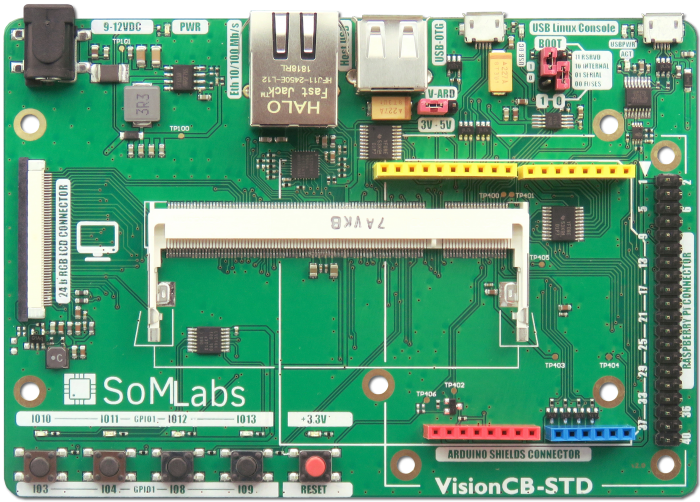
VisionCB-STD v2.0 is a carrier board for the VisionSOM family of computer-on-modules which are powered by NXP i.MX 6UL or i.MX 6ULL application processors (ARM Cortex-A7). A carrier board, together with a System on Module (SoM), makes a complete development platform similar to SBC. The carrier board houses the most common interfaces such as USB, Ethernet, UART, etc. A large variety of interfaces allows to use it as both a complete development platform or as a stand-alone end-product.
The carrier board connects with the SoM via a standard SODIMM connector.
Applications
- Industrial embedded Linux computer
- Home Appliances
- Home Automation – Smart Home
- Human-machine Interfaces (HMI)
- Point-of-sales (POS) terminals
- Cash Register
- 2D barcode scanners and printers
- Smart grid Infrastructure
- IoT gateways
- Residential getaways
- Machine vision equipment
- Robotics
- Fitness/outdoor equipment
Features
- Carrier Board (Base Board) compatible with the VisionSOM family of modules based on NXP i.MX 6UL / 6ULL application processors
- Core clock up to 696MHz (VisionSOM-6UL) or up to 900MHz (VisionSOM-6ULL)
- Up to 512MB SDRAM DDR3L (depends on used VisionSOM module)
- Up to 512MB NAND Flash / 32GB eMMC / uSD memory card (depends on used VisionSOM module)
- Optional Murata 802.11b/g/n Wi-Fi and Bluetooth v4.1+EDR module
- SoM Interface: SODIMM200
- Expansion Connectors:
- Arduino Uno Rev. 3 1x8, 1x6, 1x8, 1x10 Pin Headers (Female)
- Raspberry Pi compatible connectors 2x20 Pin Header (Male)
- Communication Connectors:
- 1x Ethernet 10/100Mbit/s, RJ45
- 1x USB Host Type A connectors
- 1x USB OTG Micro AB connector
- 1x Console MicroUSB B connector (via FTDI FT230 UART to USB converter)
- Display Interface: 50-pin FFC/FPC Parallel RGB – 24-bit, (1366 x 768 Max. Resolution)
- User Interface:
- 5 Pushbuttons
- 5 LEDs
- Boot selector
- Power Supply
- DC connector: Input Voltage 9-12V DC
- MicroUSB connector: Input Voltage 5V DC
- Temperature Range: 0 to +70°C
- Board Size: 130mm x 90mm x 17mm
Pictures of VisionCB-STD v2.0 board
| Version | Photo |
|---|---|
| VisionCB-STD v2.0 board only |
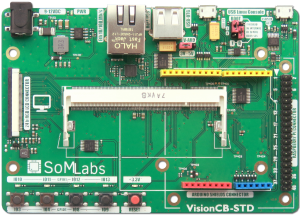 |
| VisionCB-STD v2.0 board with VisionSOM-6ULL |
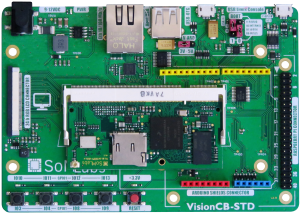 |
| VisionCB-STD v2.0 board with Raspberry Pi HAT |
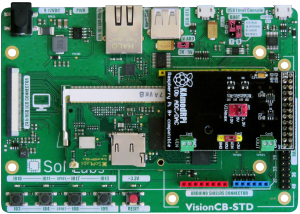 |
| VisionCB-STD v2.0 board with Arduino Shield |
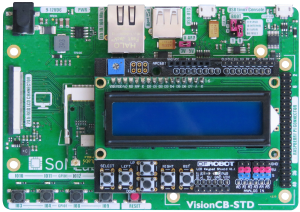 |
Ordering info
Block Diagram
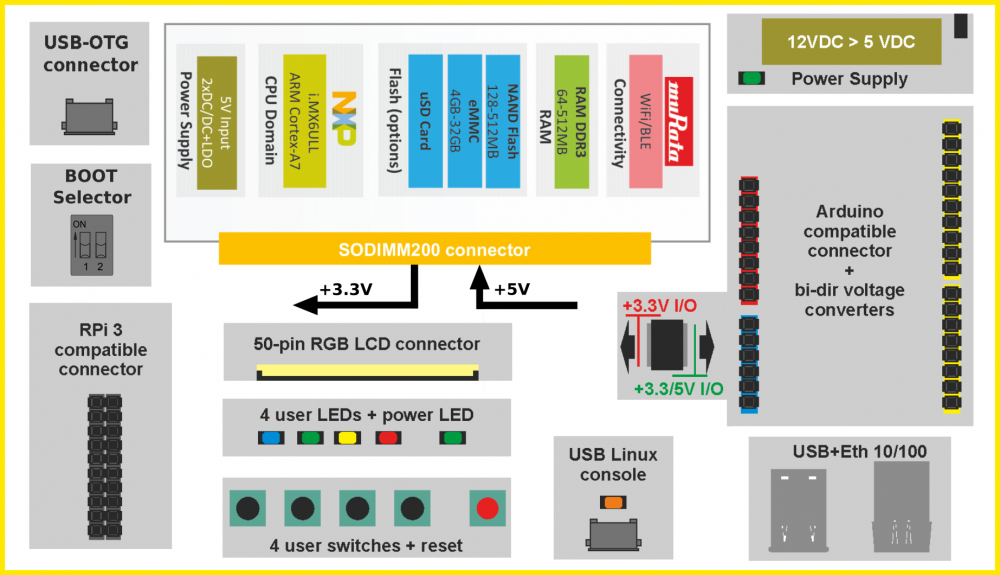
Electrical parameters
| Parameter | Value | Units | Comment | ||
|---|---|---|---|---|---|
| Min. | Typ. | Max. | |||
| Power Supply (J100 input) | 9.0 | 11.0 | 12.0 | V | Positive pole on central connector of J100 |
| Supply current | - | - | 0.15 | A | Excluding LCD, USB and antoher external loads |
| USB power supply | 4.75 | 4.9 | 5.5 | V | On J201 (Linux USB console connector) |
| Input GPIO voltage (J405) | 0 | - | 3.3 | V | LCD-RGB connector |
| Input GPIO voltage (J504) | 0 | - | 3.3 | V | Raspberry Pi compatible |
| Input GPIO voltage (J502, J503) | 0 | - | 3.3/5 | V | Arduino compatible connector (digital I/O) |
| Input GPIO voltage (J501) | 0 | - | 3.3 | V | Arduino compatible connector (analog inputs) |
Boot Selector
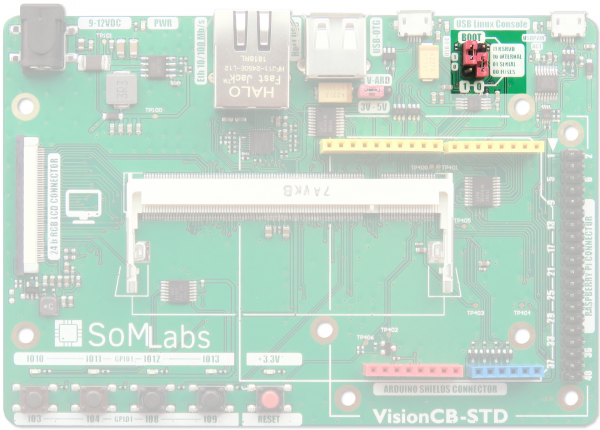
| BOOTx | Boot Mode | |
|---|---|---|
| BOOT1 | BOOT0 | |
| 1 | 1 | Reserved |
| 1 | 0 | Internal |
| 0 | 1 | Serial |
| 0 | 0 | Fuses |
Raspberry Pi compatible I/O header (J504)
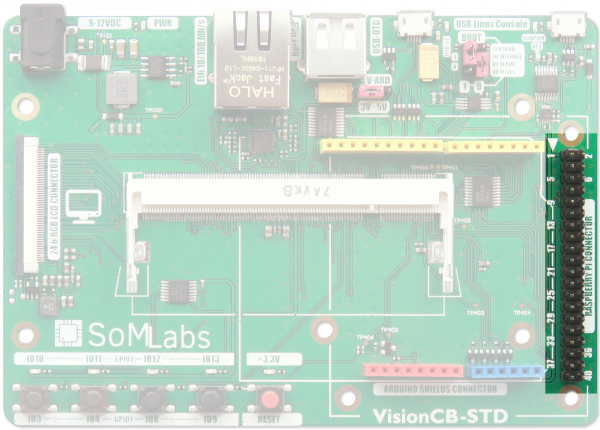
| J504 Pin | Default function name | Description |
|---|---|---|
| 1 | VCC-3V3 | +3.3V generated by internal SOM LDO converter (limited load current). |
| 2 | VCC-5V0 | +5V generated by carrier board built-in DC/DC converter. |
| 3 | UART5-RXD | Default: UART5 RxD input or universal GPIO with 3.3V logic levels. |
| 4 | VCC-5V0 | +5V generated by carrier board built-in DC/DC converter. |
| 5 | UART5-TXD | Default: UART5 TxD output or universal GPIO with 3.3V logic levels. |
| 6 | GND | - |
| 7 | ENET2_TXD0 | Default: ENET2 TXD0 line or universal GPIO with 3.3V logic levels. |
| 8 | UART4-TXD | Default: UART4 TXD output or universal GPIO with 3.3V logic levels. |
| 9 | GND | - |
| 10 | UART4-RXD | Default: UART4 RXD input or universal GPIO with 3.3V logic levels. |
| 11 | ENET2_CRS_DV | Default: ENET2 CRS_DV line or universal GPIO with 3.3V logic levels. |
| 12 | GPIO5 | Universal GPIO with 3.3V logic levels. |
| 13 | UART1-CTS | Default: UART1 CTS line or universal GPIO with 3.3V logic levels. |
| 14 | GND | - |
| 15 | UART1-RTS | Default: UART1 RTS line or universal GPIO with 3.3V logic levels. |
| 16 | GPIO8 | Universal GPIO with 3.3V logic levels. |
| 17 | VCC-3V3 | +3.3V generated by internal SOM LDO converter (limited load current) |
| 18 | GPIO9 | Universal GPIO with 3.3V logic levels. |
| 19 | UART2-CTS | Default: UART2 CTS line or universal GPIO with 3.3V logic levels. |
| 20 | GND | - |
| 21 | UART2-RTS | Default: UART2 RTS line or universal GPIO with 3.3V logic levels. |
| 22 | GPIO0 | Universal GPIO with 3.3V logic levels. |
| 23 | UART2-RXD | Default: UART2 RXD input or universal GPIO with 3.3V logic levels. |
| 24 | UART2-TXD | Default: UART2 TXD input or universal GPIO with 3.3V logic levels. |
| 25 | GND | - |
| 26 | ENET2_TXEN | Default: ENET2 TXEN line or universal GPIO with 3.3V logic levels. |
| 27 | - | - |
| 28 | - | - |
| 29 | ENET2_TX_CLK | Default: ENET2 TX_CLK line or universal GPIO with 3.3V logic levels. |
| 30 | GND | - |
| 31 | ENET2_RXER | Default: ENET2 RXER line or universal GPIO with 3.3V logic levels. |
| 32 | JTAG-MOD | Default: JTAG MOD input or universal GPIO with 3.3V logic levels. |
| 33 | UART3-CTS | Default: UART3 CTS line or universal GPIO with 3.3V logic levels. |
| 34 | GND | - |
| 35 | UART3-RTS | Default: UART3 RTS line or universal GPIO with 3.3V logic levels. |
| 36 | JTAG-TDO | Default: JTAG TDO output or universal GPIO with 3.3V logic levels. |
| 37 | ENET2_RXD1 | Default: ENET2 RXD1 line or universal GPIO with 3.3V logic levels. |
| 38 | JTAG-TDI | Default: JTAG TDI input or universal GPIO with 3.3V logic levels. |
| 39 | GND | - |
| 40 | JTAG-TMS | Default: JTAG TMS output or universal GPIO with 3.3V logic levels. |
Arduino compatible I/O headers (J500-J503)
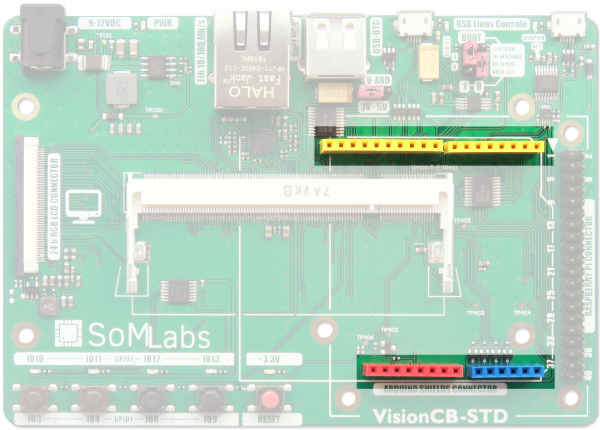
| Pin | Arduino name | Default function name | Description |
|---|---|---|---|
| Power connector J500, red connector | |||
| 1 | - | - | - |
| 2 | IOREF | VCC-3V3 | +3.3V generated by internal SOM LDO converter (limited load current). |
| 3 | RESET | POR-B | External warm reset input, active L. |
| 4 | 3.3V | VCC-3V3 | +3.3V generated by internal SOM LDO converter (limited load current). |
| 5 | 5V | VCC-5V0 | +5V generated by carrier board built-in DC/DC converter. |
| 6 | GND | GND | - |
| 7 | GND | GND | - |
| 8 | VIN | VCC-3V3 | +3.3V generated by internal SOM LDO converter (limited load current). |
| Analog inputs connector J501, blue connector | |||
| 1 | AIN0 | GPIO1 | Universal GPIO with 3.3V logic levels. |
| 2 | AIN1 | GPIO5 | Universal GPIO with 3.3V logic levels. |
| 3 | AIN2 | GPIO8 | Universal GPIO with 3.3V logic levels. |
| 4 | AIN3 | GPIO9 | Universal GPIO with 3.3V logic levels. |
| 5 | - | - | - |
| 6 | - | - | - |
| Digital I/Os connector J503, yellow connector | |||
| 1 | DIO0 | UART4-RXD | Default: UART4 RXD line or universal GPIO with 5V logic levels. |
| 2 | DIO1 | UART4-TXD | Default: UART4 TXD line or universal GPIO with 5V logic levels. |
| 3 | DIO2 | UART3-RTS | Default: UART3 RTS line or universal GPIO with 5V logic levels. |
| 4 | DIO3 | UART3-CTS | Default: UART3 CTS line or universal GPIO with 5V logic levels. |
| 5 | DIO4 | ENET2_RXER | Default: ENET2 RX ER line or universal GPIO with 5V logic levels. |
| 6 | DIO5 | ENET2_TX_CLK | Default: ENET2 TX CLK line or universal GPIO with 5V logic levels. |
| 7 | DIO6 | UART1-RTS | Default: UART1 RTS line or universal GPIO with 5V logic levels. |
| 8 | DIO7 | UART1-CTS | Default: UART1 CTS line or universal GPIO with 5V logic levels. |
| Digital I/Os connector J502, yellow connector | |||
| 1 | DIO8 | ENET2_TXD0 | Default: ENET2 TXD0 line or universal GPIO with 5V logic levels. |
| 2 | DIO9 | ENET2_CRS_DV | Default: ENET2 CRS DV line or universal GPIO with 5V logic levels. |
| 3 | DIO10 | UART2-TXD | Default: UART2 TXD line or universal GPIO with 5V logic levels. |
| 4 | DIO11 | UART2-CTS | Default: UART2 CTS line or universal GPIO with 5V logic levels. |
| 5 | DIO12 | UART2-RTS | Default: UART2 RTS line or universal GPIO with 5V logic levels. |
| 6 | DIO13 | UART2-RXD | Default: UART2 RXD line or universal GPIO with 5V logic levels. |
| 7 | GND | GND | - |
| 8 | AREF | VCC-3V3 | +3.3V generated by internal SOM LDO converter (limited load current). |
| 9 | DIO14-SCL | UART5-RXD | Default: UART5 RXD line or universal GPIO with 5V logic levels. |
| 10 | DIO15-SDA | UART5-TXD | Default: UART5 TXD line or universal GPIO with 5V logic levels. |
Notes:
1. All I/O lines are 5V compatible.
2. RESET line is 5V compatible.
3. Preferred voltage range on AIN0…AIN3 lines is 0…+3.3V.
4. Voltage level compatibility can be changed to +3.3V with removing R901 and mouting R902 (0R), but voltage range on AIN0…AIN3 lines must be 0…+3.3V.
User LEDs connections
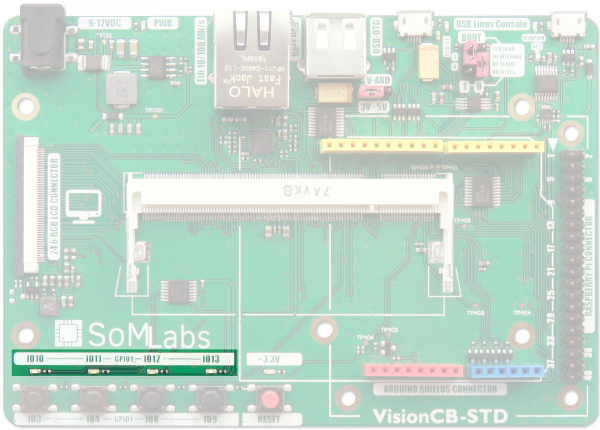
| LED | PCB symbol | GPIO | Description |
|---|---|---|---|
| D400/blue | GPIO10 | GPIO1_10 | Default: JTAG MOD input or universal GPIO with 3.3V logic levels. |
| D401/green | GPIO11 | GPIO1_11 | Default: JTAG TMS input or universal GPIO with 3.3V logic levels. |
| D403/yellow | GPIO12 | GPIO1_12 | Default: JTAG TDO input or universal GPIO with 3.3V logic levels. |
| D402/red | GPIO13 | GPIO1_13 | Default: JTAG TDI input or universal GPIO with 3.3V logic levels. |
Notes:
1. LEDs are switched on by logic „1” set at the GPIO outputs.
2. LEDs are controlled by current drivers and do not load the GPIOs.
User switches connections
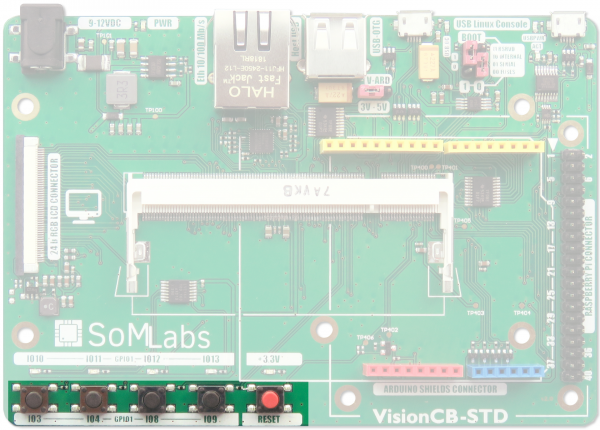
| Switch | PCB symbol | GPIO | Description |
|---|---|---|---|
| S402 | GPIO3 | GPIO1_IO03 | Universal GPIO with 3.3V logic levels. |
| S403 | GPIO4 | GPIO1_IO04 | Universal GPIO with 3.3V logic levels. |
| S404 | GPIO8 | GPIO1_IO08 | Universal GPIO with 3.3V logic levels. |
| S405 | GPIO9 | GPIO1_IO09 | Universal GPIO with 3.3V logic levels. |
Notes:
1. After button pressing on GPIO lines are set to „0”.
2. GPIO lines connected to switches are separated from board’s environment by 1k resistors.
TFT LCD connector (RGB 24b, J405)
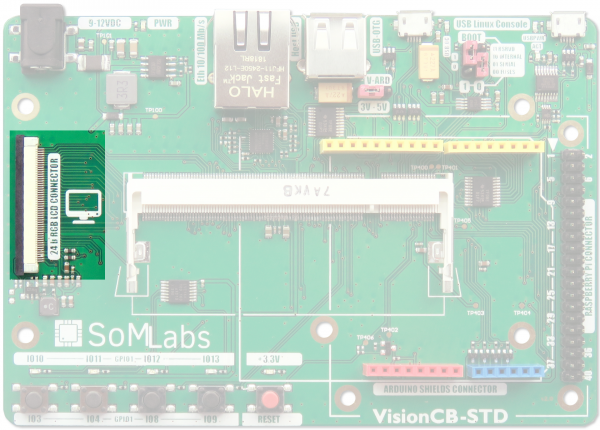
| J405 pin | Default function name | LCD interface name |
|---|---|---|
| 1 | LCD-DATA0 | LCD-B0 |
| 2 | LCD-DATA1 | LCD-B1 |
| 3 | LCD-DATA2 | LCD-B2 |
| 4 | LCD-DATA3 | LCD-B3 |
| 5 | LCD-DATA4 | LCD-B4 |
| 6 | LCD-DATA5 | LCD-B5 |
| 7 | LCD-DATA6 | LCD-B6 |
| 8 | LCD-DATA7 | LCD-B7 |
| 9 | GND | GND |
| 10 | LCD-DATA8 | LCD-G0 |
| 11 | LCD-DATA9 | LCD-G1 |
| 12 | LCD-DATA10 | LCD-G2 |
| 13 | LCD-DATA11 | LCD-G3 |
| 14 | LCD-DATA12 | LCD-G4 |
| 15 | LCD-DATA13 | LCD-G5 |
| 16 | LCD-DATA14 | LCD-G6 |
| 17 | LCD-DATA15 | LCD-G7 |
| 18 | GND | GND |
| 19 | LCD-DATA16 | LCD-R0 |
| 20 | LCD-DATA17 | LCD-R1 |
| 21 | LCD-DATA18 | LCD-R2 |
| 22 | LCD-DATA19 | LCD-R3 |
| 23 | LCD-DATA20 | LCD-R4 |
| 24 | LCD-DATA21 | LCD-R5 |
| 25 | LCD-DATA22 | LCD-R6 |
| 26 | LCD-DATA23 | LCD-R7 |
| 27 | GND | GND |
| 28 | LCD-DE | DE |
| 29 | LCD-HSYNC | HSYNC |
| 30 | LCD-VSYNC | VSYNC |
| 31 | GND | GND |
| 32 | LCD-PCLK | DCLK |
| 33 | GND | GND |
| 34 | GPIO4 | TS-YPUL |
| 35 | GPIO3 | TS-YNUR |
| 36 | GPIO2 | TS-YPLL |
| 37 | GPIO1 | TS-YNLR |
| 38 | - | - |
| 39 | - | - |
| 40 | - | - |
| 41 | - | - |
| 42 | UART5-TXD | I2C-SCL |
| 43 | UART5-RXD | I2C-SDA |
| 44 | GND | GND |
| 45 | VCC-LCD | +3.3V (controlled by ENET2_TXEN) |
| 46 | VCC-LCD | +3.3V (controlled by ENET2_TXEN) |
| 47 | VCC-5V0 | +5.0V |
| 48 | VCC-5V0 | +5.0V |
| 49 | LCD-RESET | RESET |
| 50 | JTAG-nTRST | PWREN |
Dimensions
